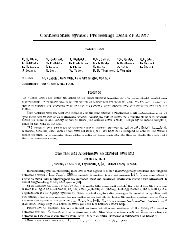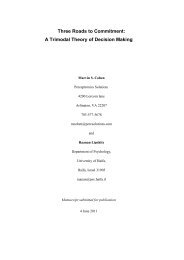Three Roads to Commitment: A Trimodal Theory of Decision Making
Three Roads to Commitment: A Trimodal Theory of Decision Making
Three Roads to Commitment: A Trimodal Theory of Decision Making
Create successful ePaper yourself
Turn your PDF publications into a flip-book with our unique Google optimized e-Paper software.
<strong>Three</strong> <strong>Roads</strong> <strong>to</strong> <strong>Commitment</strong>: A <strong>Trimodal</strong> <strong>Theory</strong> <strong>of</strong> <strong>Decision</strong> <strong>Making</strong> 62<br />
(Vol. 2). Cambridge MA: MIT Press.<br />
Simon, H. A. (1955). A behavioral model <strong>of</strong> rational choice. Quarterly Journal <strong>of</strong> Economics, 69, 99-118.<br />
Simon, H, A. (1960). The New Science <strong>of</strong> Management <strong>Decision</strong>. New York: Harper & Row.<br />
Simon, H. A. (1972). Theories <strong>of</strong> bounded rationality. In C. B. Radner & R. Radner (Eds.), <strong>Decision</strong> and<br />
Organization (pp. 161-76). Amsterdam: North-Holland. Reprinted in Simon, H. A. (1982). Models <strong>of</strong><br />
Bounded Rationality: Behavioral Economics and Business Organization (Vol. 2). Cambridge MA: MIT<br />
Press.<br />
Simon, H. A. (1976). From substantive <strong>to</strong> procedural rationality. In S. Latsis (Ed.), Method and Appraisal in<br />
Economics (pp. 129-48). Cambridge UK: Cambridge University Press. Reprinted in Simon, H. A. (1982).<br />
Models <strong>of</strong> Bounded Rationality: Behavioral Economics and Business Organization (Vol. 2). Cambridge<br />
MA: MIT Press.<br />
Simon, H. A., & Newell, A. (1958). Heuristic problem solving: The next advance in operations research. Operations<br />
Research, 6(2), 1-10.<br />
Simon, H. A. (1987). Satisficing. In U. Eatwell, M. Milgate & P. Newman (Eds.), The New Palgrave: A Dictionary<br />
<strong>of</strong> Economics (Vol. 4, pp. 243-5). New York: Macmillan.<br />
Skinner, B. F. (1953). Science and Human Behavior. New York: The Free Press.<br />
Smith, V. L. (2008). Rationality in Economics. Cambridge, UK: Cambridge University Press.<br />
Smithson, M. (1989). Ignorance and uncertainty: Emerging paradigms. New York: Springer-Verlag.<br />
Sperber, D., & Wilson, D. A. (1995). Relevance: communication and cognition. Oxford: Blackwell.<br />
Spivey, M. (2007). The Continuity <strong>of</strong> Mind. Oxford: Oxford University.<br />
Staw, B. M. (1976). Knee-deep in the big muddy: a study <strong>of</strong> escalating commitment <strong>to</strong> a chosen course <strong>of</strong> action.<br />
Organizational Behavior and Human Performance, 16(1), 27-44.<br />
Staw, B. M., & Ross, J. (1989). Understanding behavior in escalation situations. Science, 246(216), 220.<br />
Sut<strong>to</strong>n, R. S., & Bar<strong>to</strong>, A. G. (1998). Reinforcement Learning. Cambridge, MA: The M.I.T. Press.<br />
Tetlock, P. E. (1996). An alternative metaphor in the study <strong>of</strong> judgment and choice: People as politicians. In R. M.<br />
Hogarth & W. Goldstein (Eds.), Judgment and <strong>Decision</strong> <strong>Making</strong>: An Interdisciplinary Reader. Cambridge:<br />
Cambridge University Press.<br />
Tetlock, P. E., Kristel, O. V., Elson, S. B., Green, M. C., & Lerner, J. S. (2000). The psychology <strong>of</strong> the unthinkable:<br />
taboo trade<strong>of</strong>fs, forbidden base rates, and heretical counterfactuals. Journal <strong>of</strong> Personality and Social




